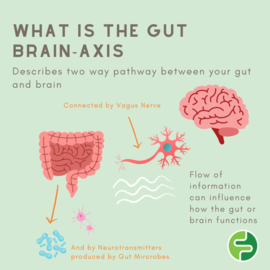Microbiome
| Interest of | • Jeffrey Epstein • Bill Gates • Heiko Schöning |
|---|---|
| Bacteria in the gut affect mood, cognition, and behavior. Heavy interest from deep state actors who also pushed the Covid jabs. | |
The microbiome (most often the gut microbiome) are the microorganisms, including bacteria, archaea, fungi, and viruses, that live in animals, in this context especially humans.[1]
Contents
Mood controller
The gut-brain axis represents a bidirectional communication system that intricately links the brain's emotional and cognitive centers with the digestive system's physiological processes. This complex network connects the central nervous system (CNS)-comprising the brain and spinal cord-and the enteric nervous system (ENS) within the gut using biochemical and physical pathways. The vagus nerve, one of the longest nerves in the body, forms the most direct link between the brain and the gut.[2]
The ENS is an elaborate mesh-like system embedded in the gut lining, housing an astonishing 200 to 600 million neurons. Dubbed our "second brain," this vast neural network, which spans from the esophagus to the rectum, contains many of the same structural elements as the brain. Instead of processing thoughts and emotions, our second brain focuses on orchestrating the digestion of food, absorption of nutrients, and intestinal motility.[2]
Bacteria in the gut, and the byproducts they produce, affect mood, cognition, and behavior. The microbiome not only responds to neurotransmitters from the brain but also produces these same neurotransmitters that regulate thoughts and emotions, such as serotonin, dopamine, norepinephrine, and GABA. The gut microbiome plays a pivotal role in regulating hormone secretion, essential in communicating with the brain to regulate sensations of hunger and satiety and are also linked to influencing learning, memory, and emotions.[2]
Poison via the microbiome

In December 2023 the German doctor Heiko Schöning predicted that a large-scale biological weapons attack would occur, as the sequel to "Covid". Huge factories[3] have been built in which enormous quantities of bacterial toxins are produced by fast-growing plants such as tobacco (by British-American Tobacco), tomatoes, lettuce, etc. The factories would officially be used for health research; however, the poisons released there could kill millions of people – by taking a "detour" via the microbiome, i.e. the intestinal flora. Countless people would die from it. The logical consequence would be the call for "saving medicines" – very similar to the artificial corona "threat", which could only be contained by the supposedly "life-saving vaccination" – for the maximum benefit and profit of the puppeteers of this staged event.[4][5]
According to Schöning, various scenarios for such an attack on the human microbiome are conceivable: the bacterial toxins could be spread via the food itself, but an open "terrorist attack" is also conceivable. Last but not least, the justification for the new "pandemic" would also be fed by the climate lies – because the alleged thawing of the polar caps would also spread ancient or unknown bacteria.[4]
When you see National Resilience and its directors, they will be at the center of the new crime. National Resilience is something like the new Emergent BioSolutions...But now there are bacteria that are resistant to almost all or all antibiotics...And you can grow them in such tanks just as National Resilience has them. And also bacterial toxins can also be bred and produced there. And then, probably, there will be a big panic again. And then the question is, what is the solution, what is the salvation now? You usually need an "antibiotic", like penicillin. But when it is resistant to penicillin, it does not help. And then, dear pharmaceutical industry, something new.
With Corona we mainly had vaccines, but the next rescue will then be mainly from tablets. Antibiotics, or rather, non-traditional antibiotics, antimicrobials. And all this wording is already in the new WHO Treaty, paragraph 4, paragraph 4G[6]....But you have to say here, attention, bacteria terror, it is being prepared...And by chance, they have already introduced this in the wording and also, in the choice of words, that there are traditional antibiotics, but also antimicrobial agents. That's a cover word for ... for everything that is not actually an antibiotic, but something else. Just as mRNA gene therapy is not a vaccination, but a gene-therapy. But it is called vaccination. So antimicrobial agents are not traditional antibiotics, but have already been introduced here.[7][8]
Edible "vaccines"
In 2021, it was reported that "UC Riverside scientists are studying whether they can turn edible plants like lettuce into mRNA vaccie factories."[9] In 2022, University of Ottawa biologists reported that they had accomplished the first steps in bringing an edible vaccine to life. It would allow to combine injectable and edible vaccines for a more comprehensive immune response and protection against COVID-19 and other viral pandemics in the future.[10][11]
Gates interest
The Gates Foundation has committed $922 million through 2026 for nutrition. It's the biggest funder of research into the microbiome, according to Bill Gates, who is excited about work on the microbiome, where bacteria in the gut can impact how the body absorbs nutrients and fights diseases.[12] He wrote that "your microbiome is not just a byproduct of your health but a determinant of it".[13]
Also Marc Benioff and Mark Zuckerberg have made donations to support microbiome research at institutions including Stanford, Washington University in St. Louis and the University of California, San Francisco, although "the science is young and unproven". Also Jeffrey Epstein invested heavily in the area.
Gates meddling with the microbiome

In a 2024 interview with BILD, Gates let know that:
The relationship between the microbiome of mothers and the future of children. There is a microbiome in the intestine that most people have. There is also a vaginal microbiome, and it has been found that it has very negative effects when either the intestine or the vaginal microbiome gets out of balance. As far as the vaginal microbiome is concerned, this leads to many stillbirths and premature births. The intestinal microbiome also has a significant influence on the risk of becoming infected with HIV. That's why all these children are malnourished. It is not because they do not consume enough calories, even if there are extreme cases when they really have to starve, most of the time it is so that their intestines become inflamed and therefore it is important to understand what foods or procedures are available so that the children get on their growth path. This not only helps them to survive, but also means that they are essentially reaching their potential, which is the most important thing for these developing countries, namely their human resources.[14]
References
- ↑ https://doi.org/10.3390%2Fnu12041096
- ↑ a b c https://longevity.stanford.edu/lifestyle/2024/04/08/more-than-a-gut-feeling-how-your-microbiome-affects-your-mood/
- ↑ https://www.premier.vic.gov.au/new-milestone-moderna-vaccine-facility
- ↑ a b https://journalistenwatch.com/2023/12/18/heiko-schoening-jetzt-kommt-der-killerbakterienterror/
- ↑ See also>https://www.youtube.com/watch?v=QHcTE9qwZ8Y
- ↑ https://apps.who.int/gb/inb/pdf_files/inb9/A_inb9_3-en.pdf or possibly Chapter II, Article 4, 3(h)
- ↑ https://www.kla.tv/27731/pdf quote is abridged
- ↑ https://odysee.com/@Uk-Rider:a/2023-12-30b_Corona20NeuerTerrorangriffMitB_klaTV-27731_360p:1
- ↑ https://www.universityofcalifornia.edu/news/grow-and-eat-your-own-vaccines
- ↑ https://www.uottawa.ca/faculty-science/please-pass-salad-edible-vaccines-produced-lettuce-protect-against-covid-19
- ↑ https://www.newsweek.com/tennessee-class-edible-vaccines-drug-lettuce-1885558
- ↑ https://www.bnnbloomberg.ca/investing/commodities/2024/09/17/bill-gates-turns-to-cows-milk-and-gut-bacteria-in-3-trillion-nutrition-fight/
- ↑ https://www.gatesnotes.com/The-Year-Ahead-2024-Ch-02
- ↑ https://www.youtube.com/watch?v=KM4u7pkeMGA
